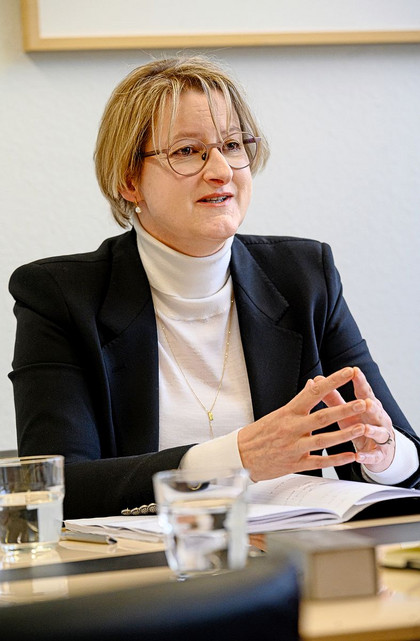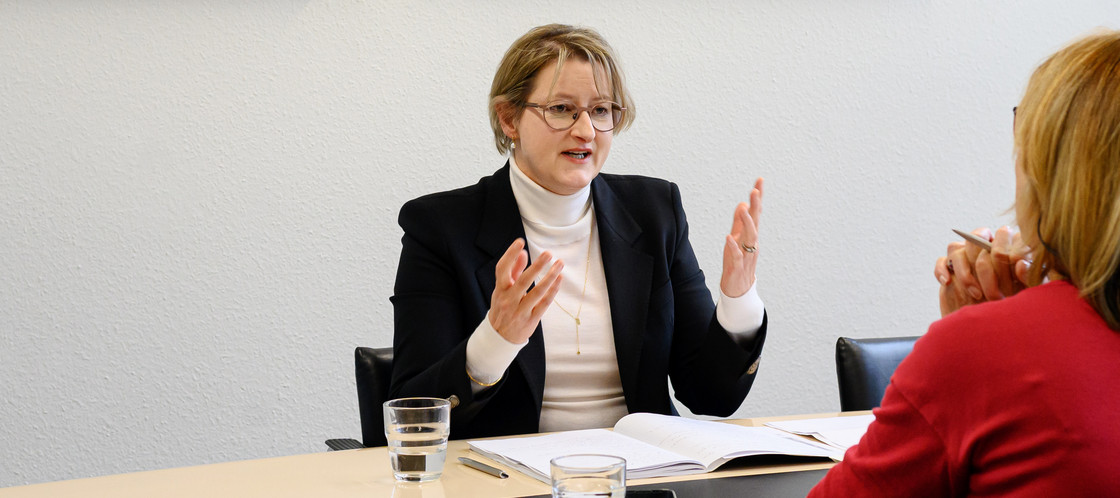![[Translate to English:]](/fileadmin/_processed_/0/d/csm_EDA-Hinweis_Mailbox-Karlsruhe-DE_Prometheus_Unsplash_39f6ff0ecc.jpg)
Please note
![[Translate to English:]](/fileadmin/_processed_/0/d/csm_online_Revue_2502_EDA-Abstimmung_c92f583a2c.jpg)
Votes and Elections

Marianne Jenni | “The Swiss Abroad are important for Switzerland’s image”

Change of address Swiss Review

Votes and Elections

The Federal Audit Office – driving efficiency and transparency since 1877

Please note


On 1 January 2025, Marianne Jenni started work as the new director general of the Consular Directorate (CD) at the Federal Department of Foreign Affairs (FDFA). In an interview with “Swiss Review”, she talks about the necessity of making consular services available online and defending the interests of the Swiss Abroad.
Marianne Jenni, you were the Swiss ambassador to Ecuador until very recently – and you now head the Consular Directorate in Berne. Were there any surprises when you returned to Switzerland?
Marianne Jenni: There were no surprises, because I already knew what returning to Switzerland is like. I returned home regularly during my three-year stint in Ecuador, and I had worked for eight years in Berne before then. You need to be adaptable as a diplomat. Without any flexibility, optimism, positivity or sense of curiosity, it would be difficult to change countries every four years and get used to a new language, mentality and culture. But Switzerland has always been my home. And I have a Swiss employer: the FDFA. My situation is different to someone who simply emigrates from Switzerland.
Marianne Jenni joined the FDFA in 1991 as a consular officer. She worked in Paris, Lagos, Rome, London, Baghdad, Kinshasa and Cape Town before returning to Berne in 2013, where she oversaw the management of local and honorary staff abroad and was responsible for the FDFA’s global property portfolio. From 2021 to 2024, she served as head of mission in Quito, Ecuador. Her responsibilities at the Consular Directorate will include optimising digital services and developing preventive measures.
Nevertheless, you are well versed in the experiences of Swiss Abroad. After all, you have also lived in places like Paris, Lagos, Rome, London, Baghdad, Kinshasa and Cape Town.
One cannot underestimate the challenge of living in a new country of which you have little or no knowledge. The first few months are never easy, because you have to restructure your everyday life.
“The political participation of the “Fifth Switzerland” is important for Swiss politics.”
How easy is it then for Swiss Abroad to maintain that connection to Switzerland?
The events that I organised in the Ecuadorian capital Quito – Swiss National Day, coming-of-age ceremonies, an event for pensioners – were always popular. Modern communication also makes it easier for people to stay connected to Switzerland. It is quite a contrast to what it used to be like a few decades ago.

Yet modern information and connectivity are not necessarily a given. Many Swiss Abroad fear that the SRG SSR online information platform swissinfo.ch could be axed under government cost-cutting measures.
Informing the Swiss Abroad is a task enshrined in the Federal Constitution. It is something we have to facilitate. The CD is working with the Organisation of the Swiss Abroad (OSA) and with SWI swissinfo in this regard. We will of course be tabling our arguments during consultation on the proposed cuts. But it is the politicians who will ultimately decide.
In Switzerland, sentiment towards Swiss Abroad appears to have cooled. Some even accuse expats of sponging off the state. Does this worry you?
I have not noticed any such sentiment during the short time I have been in office, but the portrayal is certainly problematic. If this image exists, I will work to correct that. Those who criticise are probably unfamiliar with the real-life challenges facing Swiss Abroad. In Switzerland, we rely on a system that runs like clockwork and gives us peace of mind. This is not necessarily the case everywhere else. From administrative hurdles and changing security situations, to non-existent public transport, or difficulties in obtaining social security – Swiss Abroad have to negotiate many challenges. Anyone who leaves to start a new life in another country is taking a risk.

What message would you like to relay to the “Fifth Switzerland”?
I want the Swiss Abroad to know that we are thinking of them and are there for them. The Federal Council and parliament have handed us this remit in the form of the Swiss Abroad Act. It is a remit that we take seriously. The Swiss Abroad are our ambassadors, embodying Swiss virtues like quality and reliability, whether in business, science, culture or society. They are important for Switzerland’s image.
How will you go about taking the pulse of the “Fifth Switzerland”?
One of my priorities will be to meet as many Swiss Abroad as possible and attend OSA conferences to learn about what the Swiss expatriate community is thinking, because this varies from country to country. It is also worth repeating that the Swiss Abroad can do their own bit to ensure they have a political voice, i.e. by standing for election to the Council of the Swiss Abroad and offering their insight that way.
Many Swiss Abroad are entitled to vote in elections and referendums in Switzerland but often cannot do so because the voting papers arrive much too late – which is extremely annoying.
I totally agree, because important votes are being lost. The political participation of the “Fifth Switzerland” is important for Swiss politics.
E-voting could make a difference. Will you lobby the cantons that are hesitant to introduce it?
“Anyone who leaves to start a new life in another country is, by definition, taking a risk.”
We will have a conversation with the cantons. E-voting will be one of the topics discussed.
The Consular Directorate is the central point of contact for Switzerland’s consular services around the world. What does this mean in practice?
Representations in the form of embassies or consulates function a little bit like municipal councils. You register with them – and they will take your personal details, receive your passport and identity card applications, provide the necessary documentation for marriages and divorces, offer you a temporary passport if you lose your permanent passport, help you in emergencies, assist with repatriation in the event of death, contact your family, and issue visas (as many as 700,000 visas in 2024).
In some cases, they will also provide you with money: Swiss Abroad who are destitute and, for example, have no family to support them can apply for welfare payments. Each individual case is assessed according to strict legal criteria. If the necessary conditions are met, payments can theoretically be made to cover the person’s minimum living costs in their country of residence.

How effective is Switzerland’s consular network?
Switzerland provides high-quality services across a dense consular network consisting of around 170 representations and 200 honorary representations. We have considerable expectations to live up to. Both Swiss Abroad and Swiss tourists abroad are increasing in number. We also have to cut costs by around ten percent. Hence, we need digital solutions to maintain the quality of our services. These solutions must offer added value to all involved, through efficiency gains on the one hand and customer friendliness on the other.
“When we are needed, we will be there. We have proven it in the past and will prove it again in future.”
Added value, efficiency gains, customer friendliness – but what can Swiss Abroad expect in practice?
We are thinking of creating a digital consular hub, the details of which I am unable to provide at the moment. The aim is to process cases quicker than we do today. There are no plans to close representations, as Federal Councillor and FDFA head Ignazio Cassis has assured us more than once. This is good to know. By developing a consular hub, we wish to promote the concept of personal responsibility among expatriates and tourists alike.
Does this mean that the state will take more of a back seat in future?
No, it doesn’t. When we are needed, we will be there. We have proven it in the past and will prove it again in future. However, Swiss who travel or settle abroad should keep in mind the principle of personal responsibility enshrined in the Swiss Abroad Act. More preventive work is needed of the type the FDFA already carries out. We have to get the message across even more effectively. The FDFA offers numerous sources of advice and support in this regard. For example, the SwissInTouch.ch app provides the expatriate community with easier access to Swiss representations abroad. FDFA travel advice is available to Swiss tourists, who can also register on the Travel Admin app. The pick-up in travel after Covid, an increase in independently booked holidays, and, not least, the security situation around the world are reflected in the figures, with the FDFA helpline having filed over 55,000 inquiries in 2024. In total, there were 1,087 requests for consular protection – 17 per cent more than in the previous year. There certainly seems to be one crisis after another at the moment.
Can people actually contact you around the clock?
Yes, in principle, they can – via smartphone.
Comments